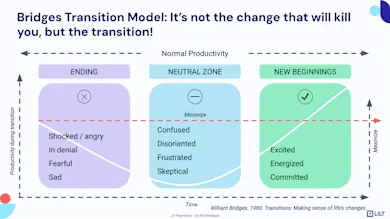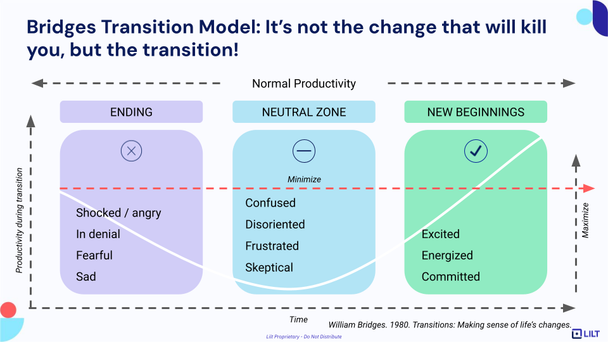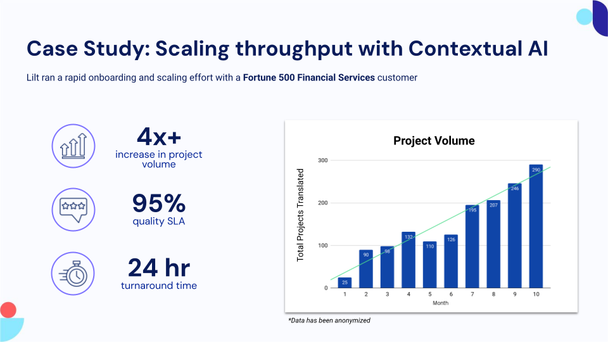AI
August 18, 2023
Evaluating Risks and Trade-offs in an AI Strategy: Webinar Recap
AI has created new opportunities and challenges traditional enterprise work. In our latest webinar, Spence Green, CEO of Lilt, delved into the risks and trade-offs of investing in an AI strategy and how to leverage it to drive enterprise-level changes.
Han Mai
Associate Director, Demand Generation

AI has created new opportunities and challenges traditional enterprise work. In our latest webinar, Spence Green, CEO of LILT, delved into the risks and trade-offs of investing in an AI strategy and how to leverage it to drive enterprise-level changes.
The webinar revolved around the concepts of risk and resilience, the role of leadership in implementing AI strategies, and how AI can augment different jobs and drive behavior change. Green also discussed the potential of AI in reducing costs, increasing agility, and expanding content generation in enterprises, sharing the example of a successful AI implementation in a Fortune 500 company.
Whether you watch the full 30-minute recording or read this recap, you will walk away with a deeper understanding of the potential of AI for your business. Below are three insightful takeaways from the webinar:
• AI can augment every job in the enterprise, leading to behavior change and increased productivity.
• Adopting a growth-oriented mindset for business leaders is crucial in implementing AI in the enterprise.
• AI can reduce costs, increase agility, and expand content generation in enterprises.
Takeaway 1: AI can augment every job in the enterprise, leading to behavior change and increased productivity.
"Enterprise AI means augmented work, which means using AI-enabled tools to do a job. It's not as if AI is going to replace software engineering. In fact, the need for software engineers is more intense than it's ever been. It’s just that people who do not adopt AI tools will simply be left behind by those who do." - Spence Green, CEO
Green emphasized the importance of viewing AI as a tool for job augmentation rather than job replacement. In order to do so, there must be behavior change in adapting to AI. Rather than being afraid of change, it's crucial to adapt and use AI-enabled tools to drive growth. Leaders must model this change by fostering understanding, developing skills, and creating reward mechanisms to help create the conditions for resilience and growth.
Takeaway 2: Adopting a growth-oriented mindset for business leaders is crucial in implementing AI in the enterprise.
"Leading for growth, we might start asking the question, what are the future jobs that AI is creating and how do we reskill for them?" - Spence Green, CEO
Given the rapidly changing AI landscape, Green discussed the importance of adopting a growth-oriented mindset when implementing AI in the enterprise. particularly noting the need to move from risk minimization to building resilience in organizations. To Green, resilience is about assuming that the world is dynamic and is going to change, and positioning ourselves for that opportunity.
Green highlighted the importance of self-directed learning in developing the necessary skills for AI implementation. In a world where the workload is transitioning to going through an AI system, language skills are becoming essential in various parts of the business. As businesses fundamentally reward value creation, AI provides immense opportunities for such value creation.

Takeaway 3: AI can reduce costs, increase agility, and expand content generation in enterprises.
The most common business case that can be made for AI is cost reduction. Sharing a case study from one of our customers, Green demonstrated the potential of AI in reducing costs, increasing agility, and expanding content generation in enterprises. He pointed out that a well-implemented AI strategy can lead to significant cost reductions, faster project turnaround times, and increased content production.
Green also emphasized that businesses fundamentally reward value creation, and AI provides immense opportunities for such value creation. As we head towards a future where we communicate with machines using natural language, Green predicts that many workflows will transition to going through an AI system.

In conclusion, AI is going to transform almost every job in the enterprise, leading to rapid and transformational change. It's crucial to foster resilience and growth by modeling behavior change, developing talent, and rewarding mechanisms. With AI-enabled tools, enterprises can reduce costs, increase agility, and expand content generation.
The future of AI in the enterprise is very bright with many opportunities for defining one's career path. It's up to us to position ourselves for the opportunities and the world of communication with machines using natural language.
Share this post
Find some time with LILT
Enterprise-grade content seamlessly translated with AI to help your business scale globally.
Book a MeetingShare this post